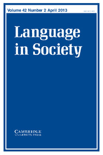
LANGUAGE IN SOCIETY
Scope & Guideline
Illuminating Language's Role in Social Dynamics
Introduction
Aims and Scopes
- Sociolinguistic Variation:
The journal extensively covers the study of how language varies and changes in different social contexts, examining factors such as ethnicity, class, gender, and age. - Language and Identity:
A core area of focus is the exploration of how language constructs and conveys identity, including studies on ethnic, cultural, and gender identities. - Language Policy and Politics:
The journal frequently addresses the implications of language policies and their socio-political contexts, including issues of language rights, multilingualism, and language education. - Discourse Analysis:
It employs discourse analysis to investigate how language is used in various social interactions, including media, politics, and everyday communication. - Cultural and Social Dynamics:
The journal explores the interplay between language and broader cultural and social phenomena, such as globalization, migration, and digital communication. - Critical Perspectives:
There is a strong emphasis on critical approaches to language, examining power relations, ideologies, and issues of inequality and social justice.
Trending and Emerging
- Translanguaging Practices:
There is a growing interest in translanguaging as a framework for understanding multilingual practices, particularly in educational and community contexts, emphasizing fluid language use. - Digital Discourse and Communication:
The impact of digital communication on language use and social interaction has gained prominence, with increasing studies on social media, online discourse, and digital identity. - Raciolinguistic Perspectives:
Emerging research is focusing on the intersections of race and language, exploring how raciolinguistic ideologies shape social interactions and identity construction. - Language and Mental Health:
The exploration of language in therapeutic contexts, particularly in relation to mental health and identity, is becoming a significant area of inquiry. - Globalization and Language Change:
Research is increasingly examining how globalization influences language practices, identity, and social dynamics, particularly in urban and migrant contexts. - Climate Change and Language:
New studies are beginning to address the relationship between language, discourse, and environmental issues, reflecting the growing importance of climate change in sociolinguistic research.
Declining or Waning
- Traditional Dialect Studies:
Research focused on traditional regional dialects has seen a decline, possibly as newer methodologies and interests in urban multilingualism and globalization take precedence. - Static Language Policies:
There is less emphasis on prescriptive language policies and more on dynamic, context-sensitive approaches to language use and policy, indicating a shift away from rigid frameworks. - Historical Linguistics:
The journal has published fewer studies centered on historical linguistics, suggesting a waning interest in diachronic analysis in favor of synchronic, contemporary sociolinguistic phenomena. - Language Acquisition Models:
The focus on traditional models of language acquisition has diminished, possibly due to the emerging focus on social interaction and the role of context in language learning. - Single-Language Studies:
There appears to be a reduced emphasis on studies that focus solely on single languages, as interdisciplinary and multilingual approaches gain traction.
Similar Journals
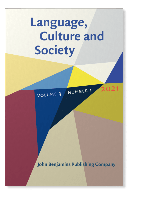
Language-Culture and Society
Illuminating the Interplay Between Words and WorldsLanguage-Culture and Society is a premier academic journal dedicated to advancing the understanding of the intricate relationships between language, culture, and society. Published by the esteemed John Benjamins Publishing Co in the Netherlands, this journal has quickly established itself as a leading platform since its inception in 2019, achieving a notable Q1 ranking in Linguistics and Language as of 2023. With a focus on interdisciplinary studies, Language-Culture and Society invites researchers, practitioners, and students to contribute and explore themes such as linguistic diversity, cultural identity, and communication practices. Despite being a non-open access publication, the journal provides unparalleled access to high-quality research articles that significantly impact the fields of linguistics and social sciences. The journal's robust Scopus rankings, placing it in the top percentiles of both Arts and Humanities and Social Sciences categories, underline its importance and relevance in contemporary linguistic discourse. Join the expanding community engaged in scholarly discussion through this vital resource, bridging the gap between theoretical insights and practical applications in today's multilingual societies.
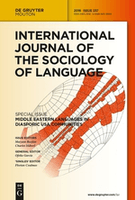
International Journal of the Sociology of Language
Unraveling the Interplay Between Language and Social ContextsInternational Journal of the Sociology of Language (ISSN: 0165-2516, E-ISSN: 1613-3668) is a premier academic journal published by WALTER DE GRUYTER GMBH in Germany, focusing on the intricate relationship between language and society. Since its establishment in 1974, this journal has continued to serve as a vital platform for disseminating high-quality research and theoretical discussions within the realms of linguistics and social sciences. Notably, it holds an impressive Q1 ranking in Linguistics and Language and maintains robust positions in Scopus rankings, being placed in the 84th and 83rd percentiles in the Arts and Humanities and Social Sciences categories, respectively. The journal not only emphasizes the socio-linguistic aspects of language use but also aims to foster interdisciplinary dialogue, making it indispensable for researchers, practitioners, and students pursuing an understanding of language within its social contexts. Although it is not an open-access publication, its rich content and scholarly contributions continue to have a significant impact within the field, making it a recommended read for anyone interested in the sociolinguistic landscape.

Treballs de Sociolinguistica Catalana
Innovating Research at the Intersection of Language and SocietyTreballs de Sociolinguistica Catalana is a distinguished open-access journal published by the Institut d'Estudis Catalans, focusing on the critical intersection of sociology and linguistics within the Catalan-speaking regions. With an ISSN of 0211-0784 and an E-ISSN of 2013-9136, this journal has been a vital platform for research since its transition to open access in 2007, facilitating broad dissemination and accessibility of scholarly works. Located in the heart of Barcelona, Spain, the journal aims to foster dialogue and understanding of sociolinguistic phenomena, promoting collaboration among researchers, professionals, and students. By publishing high-quality, peer-reviewed articles that explore language use in social contexts, Treballs de Sociolinguistica Catalana contributes significantly to the study of Catalan language and its sociocultural implications, positioning itself as an essential resource for those invested in the dynamic field of sociolinguistics.
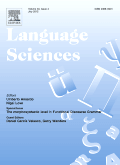
LANGUAGE SCIENCES
Pioneering Research in Language StudiesLANGUAGE SCIENCES, published by Elsevier Science Ltd, stands as a prominent journal in the field of linguistics and language studies. With an impressive impact factor that solidifies its reputation, it holds a Q1 ranking in both the linguistics and language categories for 2023, reflecting its excellence and relevance in cutting-edge research. Since its inception in 1979, this journal has evolved to encompass a wide range of interdisciplinary studies, providing a platform for innovative research that addresses the complexities of language use, acquisition, cognition, and social interactions. The journal is hosted in the United Kingdom and features rigorous peer-reviewed articles that contribute significantly to both the academic community and practical applications in language-related fields. With access options tailored for a diverse range of readers and contributors, LANGUAGE SCIENCES invites scholars, students, and professionals to engage with its comprehensive body of work and contribute to the ongoing discourse in linguistics.
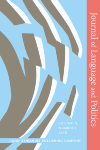
Journal of Language and Politics
Unpacking the Language of Governance and SocietyThe Journal of Language and Politics, published by John Benjamins Publishing Co, stands at the forefront of interdisciplinary research, merging the fields of linguistics, political science, and sociology. With an ISSN of 1569-2159 and an E-ISSN of 1569-9862, this esteemed journal has been a pivotal platform for scholarly discourse since its inception in 2002. As of 2023, it holds a prestigious Q1 ranking in multiple categories, including History, Linguistics and Language, and Sociology and Political Science, showcasing its significant impact and relevance within the academic community. Researchers, professionals, and students will find a wealth of rigorously peer-reviewed articles that explore the intricate ways language influences political behavior, social structures, and cultural discourse. Although not an open access journal, it remains an essential resource for those invested in understanding the dynamic interplay between language and politics, enriching the study of social phenomena on a global scale.
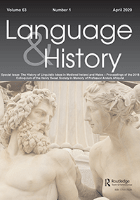
Language & History
Fostering Dialogue Between Linguistics and HistoryLanguage & History is a distinguished journal published by Routledge Journals, Taylor & Francis Ltd, focusing on the intersection of linguistics and historical context. With an ISSN of 1759-7536 and an E-ISSN of 1759-7544, this journal serves as a vital platform for scholars exploring the dynamic relationship between language evolution and historical narratives. It is recognized for its contributions to the field, holding a Q2 ranking in Linguistics and Language for 2023, reflecting its esteemed position among peer publications. Indexed in Scopus with notable rankings in both Arts and Humanities and Social Sciences, Language & History aims to foster innovative research, shed light on language change, and encourage cross-disciplinary dialogue. The journal operates without open access, providing rigorous peer-reviewed content for researchers, professionals, and students alike, ensuring that cutting-edge studies remain at the forefront of linguistic research. Published biannually, it continues to attract a diverse array of contributions that enrich the understanding of language within historical contexts, making it an essential resource in the academic community.
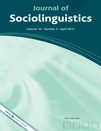
JOURNAL OF SOCIOLINGUISTICS
Advancing Understanding of Linguistic DiversityThe Journal of Sociolinguistics, published by Wiley in the United Kingdom, is a leading interdisciplinary journal that explores the intricate relationships between language and society. With an impressive impact factor reflecting its Q1 quartile ranking in Histories and Philosophy of Science, Linguistics, Philosophy, and Sociology, this journal is recognized for its scholarly contributions, making it a vital resource for academics and practitioners in these dynamic fields. Covering a wide scope of topics from language variation and change to sociocultural dynamics, the journal has converged from 2004 to 2024, ensuring a comprehensive understanding of contemporary sociolinguistic issues. Although operating under a traditional access model, the Journal of Sociolinguistics remains pivotal for advancing critical dialogue and research for professionals, researchers, and students invested in linguistic and sociological studies.
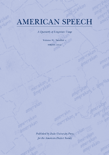
AMERICAN SPEECH
Advancing Critical Conversations in Communication and LinguisticsAMERICAN SPEECH, published by DUKE UNIVERSITY PRESS, stands as a premier journal in the fields of Communication and Linguistics, boasting a commendable Q1 rating in both disciplines as of 2023. With its ISSN 0003-1283 and E-ISSN 1527-2133, this scholarly publication offers a vital platform for innovative research and critical discussions surrounding language in American societal contexts. Covering a broad spectrum of topics from linguistic theory to sociolinguistic analysis, AMERICAN SPEECH addresses the nuanced dynamics of speech and language, making it an essential resource for researchers, professionals, and students alike. Although the journal is not open access, its high Scopus rankings reflect its influence and reach within the academic community, ranking #263 out of 1088 in Language and Linguistics and maintaining a respectable 75th percentile. As the discourse surrounding language continues to evolve, AMERICAN SPEECH remains at the forefront, engaging with contemporary debates and fostering a deeper understanding of the roles language plays in society.
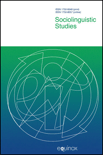
Sociolinguistic Studies
Illuminating Language's Role in Social DynamicsSociolinguistic Studies, published by EQUINOX PUBLISHING LTD, is a premier academic journal dedicated to advancing the understanding of language in its social context. With an ISSN of 1750-8649 and an E-ISSN of 1750-8657, this journal plays a vital role in the fields of linguistics, sociology, and political science, offering a platform for interdisciplinary research that bridges diverse theoretical frameworks and methodologies. Since its inception in 2008, the journal has remained committed to publishing high-quality research that contributes to the critical engagement with sociolinguistic phenomena globally. With a categorization of Q3 in both Linguistics and Language and Sociology and Political Science as of 2023, and notable Scopus rankings reflecting its intellectual contribution, Sociolinguistic Studies is essential for researchers, professionals, and students aiming to explore the intricate relationships between language, society, and identity. Although open access is not currently available, the journal's scholarly impact continues to grow as it shapes contemporary discussions in sociolinguistics through rigorous peer-reviewed articles.
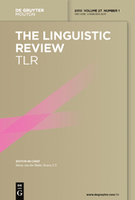
LINGUISTIC REVIEW
Advancing Linguistic Inquiry, One Article at a Time.LINGUISTIC REVIEW is a prestigious academic journal published by De Gruyter Mouton that has established itself as a leading platform in the field of Linguistics and Language. With an impressive impact factor and categorized in the Q1 Quartile for the year 2023, this journal ranks within the top tiers of its discipline, indicating its influential contributions to linguistic research. Covering an extensive range of topics from theoretical frameworks to applied linguistics, the journal aims to foster scholarly dialogue and advance the understanding of language in its myriad forms. Researchers and students alike will benefit from the rigorous peer-review process and the availability of in-depth studies published from 1981 onwards. While the journal is not open access, it is renowned for its exceptional quality and relevance in both the Arts and Humanities and Social Sciences classifications, with Scopus rankings placing it in the top percentile of its peers. By offering insight from leading scholars, LINGUISTIC REVIEW remains an indispensable resource for those who are passionate about linguistic inquiry and its real-world applications.